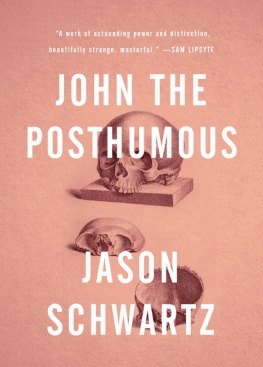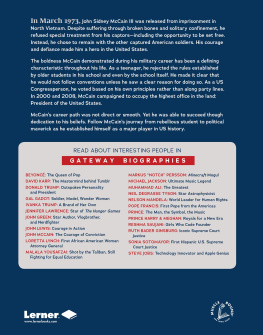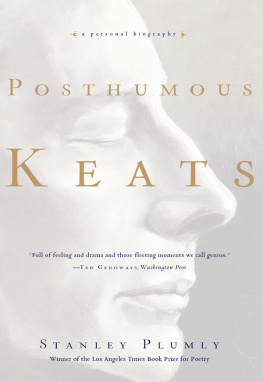
Haunting, original prose by a writer unlike any other on the planet. Jason Schwartz is a master. BEN MARCUS
[Schwartz] is complete, as genius agonizingly is. GORDON LISH
JOHN THE POSTHUMOUS exists in between fiction and poetry, elegy and history: a kind of novella in objects, it is an anatomy of marriage and adultery, an interlocking set of fictional histories, and the staccato telling of a murder, perhaps two murders. Knives, old iron gates, antique houses in flames; Biblical citations, blood and a history of the American bed: the unsettling, half-perceived images, and their precise but alien manipulation by a master of the language will stay with readers. Its themes are familiarviolence, betrayal, failureits depiction of these utterly original and hauntingly beautiful.
JASON SCHWARTZ was born in New York and lives in Florida. The author of A German Picturesque , his work has appeared in American Letters & Commentary, Antioch Review, Conjunctions, New York Tyrant, The Quarterly, StoryQuarterly, Unsaid, and other publications.
P RAISE FOR JASON SCHWARTZ
JOHN THE POSTHUMOUS
Do I not, in speaking as I sense I must, exploit, for my own purpose, the uncanny beauty another man has made? Theyre spangled feathersthe lives, the achievements, the properties of others. Who among us does not have a nest to keep stewarded with all the glitter gatherable in reach? Let me tell you something: if the act of the profiteer is what we are talking about, then living better, for my part, couldnt be any better than my having lived long enough for me to enrich myself by dint of realizing the least proximity to the insuperably forged sentences of Jason Schwartz. As for the author, this mandarin heretofore hidden among us, there is positively nothing I can usefully say to you for him or of him or to him. He is complete, as genius agonizingly is. Can there be a more ghastly occupation? It is no guess that it had to have been terrible for Schwartz to have contained John the Posthumous and its equally uncontainable antecedent, the 1998 collection of sinuosities brought out as A German Picturesque. How reckless of Jason Schwartz for him to have recommended himself for the test of turning a totalized form of attention over to such a quality of suffering. Yes, the folly of it, declares your opportunistic intercessor. Oh, but how lucky the forerunner is!how thrillingly, how terrifically, how unimprovably lucky.
GORDON LISH
A GERMAN PICTURESQUE
Grandly intrepid In story after story, his cool language scrutinizes the world; behind this smooth prose seethe the violence and confusion of many lives, many acts Unlike much so-called experimental fiction, Schwartzs work contains genuine passion and invention.
N EW Y ORK T IMES
A careful construct of repeated words, phrases and description lends the book a steady, subtle pulse which belies a guiding inner logic that is entirely its own Those whose idea of a good-time read is a literary Rubiks Cube have a colorful new toy on their hands.
D ETROIT F REE P RESS
An extraordinary, associative, allusive artist whose stories in scope, innuendo, subtlety are like reading T.S. Eliot in prose Schwartzs pieces can keep a reader mystified in almost every way who, why, what, where but never in the perfect logic of sentences moving forward one after another: what comes next, comes next, most often brilliantly and sometimes breathtakingly His vast but miniaturist genius is for seeing the enormous in the tiny, the significant in the silent, the horror-filled in the mute, the voicelessly poetic in almost everything.
K IRKUS R EVIEWS

ALSO BY JASON SCHWARTZ
A German Picturesque
2013 Jason Schwartz
Portions of this book first appeared in American Letters & Commentary, The American Reader, The Antioch Review, failbetter, Green Mountains Review, H_NGM_N, New York Tyrant, Salt Hill, Unsaid, and Web Conjunctions.
Published by OR Books, New York and London
Visit our website at www.orbooks.com
First printing 2013
All rights reserved. No part of this book may be reproduced or transmitted in any form or by any means, electronic or mechanical, including photocopy, recording, or any information storage retrieval system, without permission in writing from the publisher, except brief passages for review purposes.
Cataloging-in-Publication data is available from the Library of Congress.
A catalog record for this book is available from the British Library.
ISBN 978-1-939293-21-3 paperback
ISBN 978-1-939293-22-0 e-book
Typeset by Lapiz Digital, Chennai, India.
Printed by BookMobile in the United States and CPI Books Ltd in the United Kingdom. The U.S. printed edition of this book comes on Forest Stewardship Council-certified, 30% recycled paper. The printer, BookMobile, is 100% wind-powered.
SUSAN POLLARD
19431998
HORNBOOK
ONE
T he maiden nameand then a list of the sisters.
Eleanor, the youngest, is first. From afarthe distance between the fencepost and the road, say, or between you and the houseshe appears to fall into a well. In fact, she vanishes in the bracken. Audrey is smallest. Fire irons and a brown wall, a skirt with a nailhead pattern. Drawn curtains are rather less charming than a drowningas the mother has it. While the bedsheets, according to that old saying, are the knives of the bed. Blanche, the eldest, is last. They imagine her struggling along, arriving at the wrong house. Or returning to the staircase, now more amply rouged.
The mother sits upright, apart from the father.
Whose brotherEdward, or perhaps Edmondsuffers quite elaborately. His humiliations, thenat a Western elevation, or as a boy, or one day in the fall. They part on a boulevard, at the far end, near a park. Or near a harbor the following summer. And so on, as it rains into the front room. Where his daughteryou might observe, from above, the route of her departuresits without a suitor. Her nameGertrude, in blue inkfails to account for the portrait of horses, the lampshade in the fireplace, the hour.
The grandmother, on the fathers side, weeps in the greenery.
Her sisterEstherlives on a finer street, east of here, near the river. She addresses herself to the brass doorstopit is a rat in the purse, it turns out, and not a mouseand then to her husbands ruined shoes. The husbandWilliam, in cursiveis bedridden, or seems unwell, ill, if somewhat better now, curiously so, especially in the evening. On the huntboard is a hand of pork, garnished with black olivesthough he prefers green. His plate resembles a gray face, the knife covering the eyes.
The grandfather, on the fathers side, points the blade this way.
His brotherthe name is gonereturns at nine oclock. Ten oclock, as they imagine ita train station and a lawn, a mishap on a bridge. Or a burnt hat-rack and a metal hook, his wife attired in a gown of some kind. The wifeAnne, or perhaps Annastands rather as your sister does, facing the drapery. Her possessions, thenon the windowsill, on the dressing table, in the bureau drawer. The bedpost, from a more sensible angle, might obscure a portion of the wardrobe, and divide the room in two.
TWO
I .
C orinthians begins with the salutation, and not, as I had thought, a description of locusts on a hilltop. Or even beetles in a forest, a woods, a copseon pine trees, for instance, as behind our house. Chapter two cites declineI came before you in weakness, tremblingthough this offers little about a burning town. I imagine axles and a wagon wheel, somehow, and then an animalits shriek, I should think, rather like the sound a child makes, crying out at night. Chapter three cites firein Romans, by contrast, a wooden throat follows a page of flesh, or vice versabeside the tower and the house and the road. Silver, in a later passage, is placed at a wall or at a gate, despite the color of the jackals. Chapter four cites rags, which, displayed thus, may remind you of certain birds, such as those lost at the falls. They were blinded, were they not? Or perhaps they died of fright. It was smoke or fog, according to that storya great gray arrangement. The plumage was blue, yes, but I am partial to the rabbits in the bracken. Chapter five cites Satan, even if, on occasion, the body is a boys. The organs and the bones, anywaythough these are soon replaced with hay and straw. The latter is blackI hate to admit how this still gives my heart a startand the garment white. Chapter six cites thieves and adulterersrather than, as in Timothy, a list of widows. The terms differ somewhat in the Egyptian conception, where demons accompany each affliction. Here, the canopy signifiesin one of the less extravagant descriptionsa crown. When the canopy depicts figures of the victim, or victims, the cords are red to indicate places of contagion. The sackcloth vanishes, I gather, from the other houses, north along the road.
Next page









![Charles Schwartz [Charles Schwartz] - Who Changes Everything : Unlock The Secret That Will Transform Your Life](/uploads/posts/book/129962/thumbs/charles-schwartz-charles-schwartz-who-changes.jpg)



